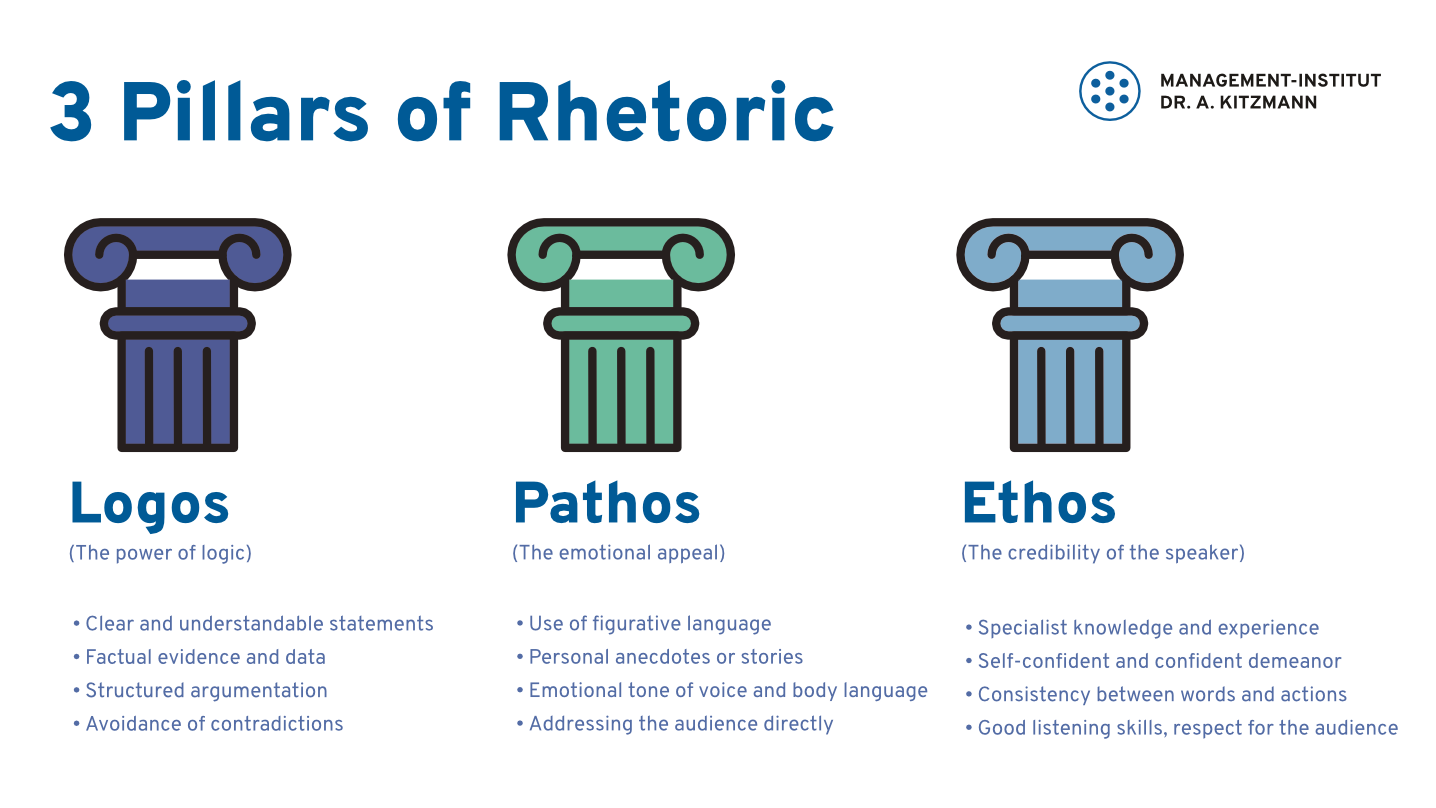
The 3 pillars of rhetoric: the basics of persuasive speaking
Many people are regularly faced with the challenge of giving presentations to colleagues, superiors or customers in their day-to-day work. However, even good specialist knowledge is often not enough to really convince the other person. The decisive factor is how a message is conveyed. Clear and effective rhetoric can make the difference between a successful presentation and an unconvincing speech. Good rhetoric is a skill that can be learned and is based on proven principles. We will introduce you to the three pillars of rhetoric and show you how to use them to communicate confidently and convincingly.
What are the basics of rhetoric?
Rhetoric is the art of effective and persuasive speaking. If you want to improve your rhetoric, you should familiarize yourself with the basic argumentation techniques and work specifically on the way you express yourself. For managers in particular, rhetoric is a decisive factor in motivating employees, conveying visions and conducting negotiations with confidence. Rhetoric is based on three pillars that together make up a convincing speech. These pillars were defined by Aristotle in ancient times and are still of central importance today.

Pillar 1: Logos - The power of logic
Logos stands for the logical argumentation of a speech. A well-structured argument is important in order to convince the audience with comprehensible and coherent thoughts. This includes
- Clear and understandable statements
- Factual evidence and data
- Structured argumentation with a logical structure
- Avoidance of contradictions
Logos is particularly important in factual discussions, scientific presentations and business negotiations.
Pillar 2: Pathos - The emotional appeal
Pathos refers to the emotional impact of a speech. People are not only persuaded by facts, but also by a targeted emotional appeal. This includes
- Use of figurative language
- Personal anecdotes or stories
- Emotional tone of voice and body language
- Addressing the audience directly
Pathos is particularly suitable for arousing enthusiasm, involving listeners emotionally and convincing them.
Pillar 3: Ethos - the credibility of the speaker
Ethos describes the personal authority and credibility of a speaker. Listeners are more likely to trust people who appear competent and authentic. Important aspects of ethos are
- Specialist knowledge and experience
- Self-confident and confident demeanor
- Consistency between words and actions
- Good listening skills and respect for the audience
Managers in particular benefit from a high ethos as it strengthens their credibility and leadership.
Applying the basics successfully
In order to be able to apply the three pillars of rhetoric, you should pay attention to the following points:
- Structured preparation: a clear outline of the speech with a strong introduction, main body and conclusion
- Body language training: Use gestures, facial expressions and voice in a targeted manner to support the argumentation
- Targeted pauses and emphasis: This increases the impact of what is said and creates tension
- Adapting to the audience: Responding to the interests, opinions and emotions of the listener
- Active listening: Noticing the audience's reaction and responding flexibly to questions or objections

What mistakes should you avoid when speaking?
Even experienced speakers sometimes make mistakes that weaken the impact of their message. The most common mistakes include
Unstructured argumentation: a lack of clarity leads to the audience being unable to follow the speech
Too many technical terms and complicated language: This creates distance to the listener and makes it difficult to understand
Monotonous speaking style: A monotonous voice without emphasis or variation has a soporific effect
Lack of authenticity: listeners recognize when a speaker is insecure or untrustworthy
Excessive use of filler words: Terms such as “um”, “so to speak” or “therefore” weaken the rhetorical effect
In conclusion: rhetoric is training
Rhetoric is a skill that can be learned and improved through regular practice. If you want to improve your rhetoric, you should consciously pay attention to the three pillars. Persuasive rhetoric is essential, especially for managers, in order to motivate teams, conduct negotiations successfully and communicate decisions clearly. Rhetoric training, for example through seminars or individual coaching, can help you to further develop your own argumentation techniques and avoid rhetorical mistakes.